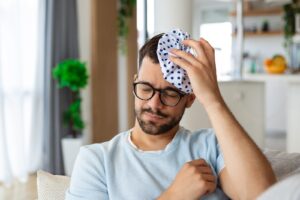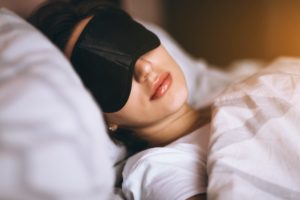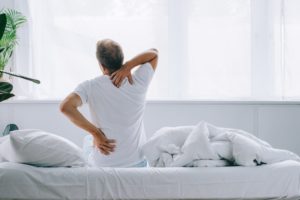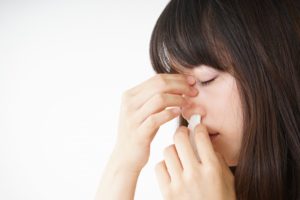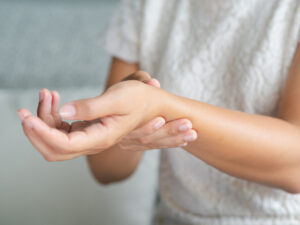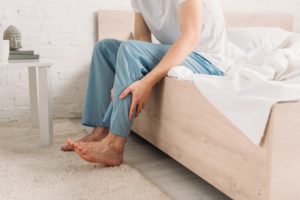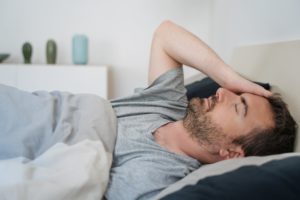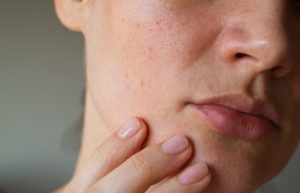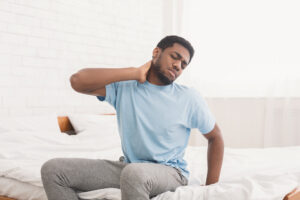How To Sleep with Tinnitus
Tinnitus is a common medical condition in which a person hears ringing, buzzing, or other sounds that do not come from an external source. While the causes and severity of tinnitus differs from person to person, people often report that tinnitus can make it difficult to concentrate during the day and fall asleep at night.
For many people with tinnitus, silence makes their symptoms more noticeable at bedtime. Because losing sleep can further exacerbate tinnitus and increase stress and anxiety, it’s important for people with tinnitus to find ways to cope with nighttime symptoms. Fortunately, tinnitus can often be managed and several strategies may help to reduce symptoms.
Try White Noise (Sound Therapy)
Many experts suggest using white noise to mask the sound of tinnitus. Ambient noise can distract from the sounds of tinnitus and make it easier to fall asleep. Simple ways of producing white noise at bedtime include:
- Gentle music from a bedside speaker
- A sound machine
- An overhead or bedside fan
- Turning on a humidifier or dishwasher
Additionally, the use of pleasant or calming sounds, such as waves crashing or rain falling can also help distract the brain from tinnitus.
Because loud sounds can cause tinnitus and make it worse , it’s important to protect hearing by keeping the volume of white noise low.
Elevate Your Pillow
Tinnitus can be caused by a variety of medications and medical conditions, including loud noises, hearing loss, and ear infections. In some cases, congestion from inflammation or mucus can contribute to symptoms. In these cases it may be helpful to elevate the top of the bed or prop up the head with pillows to reduce congestion.

Create a Bedtime Routine
Creating a regular bedtime routine can signal to the body that it’s time to wind down and prepare for sleep. Consistent habits before bed, like reading a book, avoiding screen time, taking a warm bath, or practicing relaxation exercises, can help people fall asleep faster and get better quality sleep.
Managing stress improves sleep and is an important part of living with tinnitus because stress and anxiety can worsen tinnitus symptoms. Therefore, incorporating stress-reducing activities, such as meditation or deep breathing exercises, into a bedtime routine can be beneficial. Overall, healthy sleep hygiene can decrease the time it takes to fall asleep and achieve better quality sleep which has shown to reduce tinnitus.
Reduce Caffeine, Alcohol, and Tobacco
Caffeine is a stimulant found in coffee, tea, chocolate, and many energy drinks and sodas. Consuming caffeine late in the day can interfere with sleep and make the symptoms of tinnitus worse. Experts advise avoiding caffeine for at least eight hours before bedtime.
Both drinking alcohol and smoking tobacco can also worsen tinnitus. Reducing or eliminating these substances is another important step in managing tinnitus.
Talk to a Doctor
It’s important to talk to a doctor about new, persistent, or bothersome tinnitus. A doctor can perform tests and order imaging studies to look for the underlying cause of tinnitus and recommend treatments to reduce the severity of symptoms.
Sometimes tinnitus goes away spontaneously, without any treatment at all. However, there are several treatment options for tinnitus that require a prescription from a doctor. For example, tinnitus maskers are prescription devices that fit like a hearing aid. The device masks sounds from tinnitus by sending soft and consistent noise into the ear.
Although medications are not a common treatment for tinnitus, doctors may recommend medications and other treatments for insomnia , depression, and other effects of tinnitus that interfere with sleep.
Find a Specialist
A doctor can also provide a referral to a treatment center, doctor, or mental health professional that specializes in tinnitus. Specialists can provide education and other tools for living with tinnitus , such as therapy and biofeedback.
- Cognitive Behavioral Therapy (CBT): CBT is a form of counseling that helps people shift the ways they think, feel, and behave in response to tinnitus symptoms.
- Tinnitus Retraining Therapy (TRT): Tinnitus retraining therapy changes the way the brain responds to tinnitus, making the sounds less noticeable and bothersome. TRT allows the natural ability of the brain to “habituate” a noise so that it does not reach conscious perception. It often includes a combination of sound therapy and counseling.
- Biofeedback: Biofeedback in a technique that can help people learn to notice and control the body’s physical response to tinnitus. Treatment often involves monitoring and learning to regulate breathing, heart rate, and other body functions.

Still have questions? Ask our community!
Join our Sleep Care Community — a trusted hub of sleep health professionals, product specialists, and people just like you. Whether you need expert sleep advice for your insomnia or you’re searching for the perfect mattress, we’ve got you covered. Get personalized guidance from the experts who know sleep best.
References
10 Sources
-
Kaylie, D. M. (2022, December). Ear ringing or Buzzing. Merck Manual Consumer Version., Retrieved September 3, 2023, from
https://www.merckmanuals.com/home/ear,-nose,-and-throat-disorders/symptoms-of-ear-disorders/ear-ringing-or-buzzing -
Dinces, E. (2021, October 6). Patient education: Treatment of tinnitus. D. Deschler (Ed.). UpToDate., Retrieved September 3, 2023, from
https://www.uptodate.com/contents/treatment-of-tinnitus -
Dinces, E. (2021, October 6). Patient education: Tinnitus (Beyond the basics). D. Deschler (Ed.). UpToDate., Retrieved September 3, 2023, from
https://www.uptodate.com/contents/tinnitus-ringing-in-the-ears-beyond-the-basics -
National Heart, Lung, and Blood Institute. (2022 March 4). Sleep deprivation and deficiency., Retrieved September 3, 2023, from
https://www.nhlbi.nih.gov/health/sleep-deprivation/healthy-sleep-habits -
UpToDate. (n.d.). Patient education: Tinnitus (The basics). UpToDate., Retrieved September 3, 2023, from
https://www.uptodate.com/contents/tinnitus-ringing-in-the-ears-the-basics -
A.D.A.M. Medical Encyclopedia. (2022, May 30). Tinnitus. MedlinePlus., Retrieved September 3, 2023, from
https://medlineplus.gov/ency/article/003043.htm -
Tunkel, D. E., Bauer, C. A., Sun, G. H., Rosenfeld, R. M., Chandrasekhar, S. S., Cunningham, E. R., Jr, Archer, S. M., Blakley, B. W., Carter, J. M., Granieri, E. C., Henry, J. A., Hollingsworth, D., Khan, F. A., Mitchell, S., Monfared, A., Newman, C. W., Omole, F. S., Phillips, C. D., Robinson, S. K., … Whamond, E. J. (2014). Clinical practice guideline: tinnitus. Otolaryngology Head and Neck Surgery, 151(2 Suppl), S1–S40.
https://pubmed.ncbi.nlm.nih.gov/25273878/ -
NIH Office of Communications and Public Liaison. (2022, May). Noise complaints., Retrieved September 3, 2023, from
https://newsinhealth.nih.gov/2022/05/noise-complaints -
National Institute on Deafness and Other Communication Disorders. (2023 May 3). Sleep deprivation and deficiency., Retrieved September 3, 2023, from
https://www.nidcd.nih.gov/health/tinnitus -
MedlinePlus: National Library of Medicine (US). (2021, November 9). Biofeedback., Retrieved September 3, 2023, from
https://medlineplus.gov/ency/article/002241.htm


